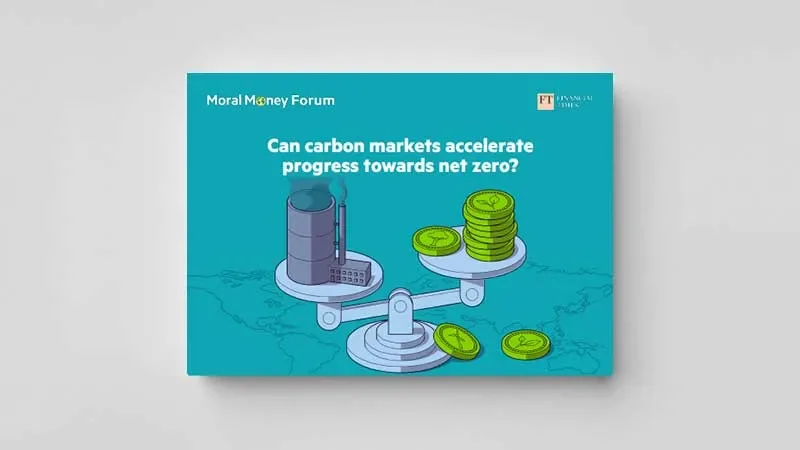Sustainability
Your investment objectives, your ESG choices.
Our Head of Investments, Christel Rendu de Lint, explores this topic in the latest report from the FT Moral Money Forum, of which we’re a proud partner. Available for download now, the June edition focuses on carbon markets, with Christel arguing that while compliance markets are currently doing the heavy lifting, voluntary markets will pick up speed.
Find out why Vontobel believes that while carbon markets represent one efficient tool in the net-zero toolbox, those opportunities are accompanied by some challenges, and why the world will need collaboration to tackle the transition towards decarbonization.

At Vontobel, we focus on actively shaping the future of investing. We exist to enable investors to build better futures and, fittingly, future-proofing investing is one of our strategic priorities right now. In the context of the climate challenge, this means standing with the wider investment community to take action on this globally urgent issue.
As a global investment firm and a corporate citizen, we are committed to helping actively shape this transition to the best of our capabilities and reach. We want to contribute to the realisation of the UN Sustainable Development Goals and we are committed to supporting the Paris Agreement and its goal of limiting the rise in global temperatures to well below 2°C, with a target of 1.5°C.
It is not a fight that one sector — let alone one company — can win alone. Indeed, collaboration leads to the actions that are so desperately needed. With few companies on track to deliver the agreed upon 7 per cent per annum reduction on an absolute emissions basis, there is no time to waste. To say addressing carbon emissions is urgent errs on the side of understatement. One way the financial sector is participating in the climate change fight is by enabling market participants to access carbon markets, which have emerged as a helpful mechanism to support companies in meeting ambitious goals for the reduction of greenhouse gas emissions.
The growth of this marketplace has brought the benefit of increased regulatory scrutiny, increased reporting transparency and wider ESG disclosures — factors that, in turn, help to garner further support for, and an acceptance of, carbon markets. Today, 44 per cent of listed companies have set a decarbonisation target. Currently compliance markets are doing the heavy lifting, but voluntary markets will pick up speed as corporate decarbonisation targets edge into the spotlight — and this is where we think a real difference can be made.
From our perspective as an investment manager, we see carbon markets as an efficient tool: they are agnostic, in the sense that they do not dictate the investment instruments required, and they support the transition towards both a green economy and decarbonisation. However, there are also challenges to be acknowledged. Despite offering a solution, carbon markets are only one tool in the net zero toolbox and one geared towards the management of emissions as opposed to their elimination. And this is where we see some challenges in carbon markets.
Firstly, the current pricing of carbon credits is a fraction of what is needed if carbon markets are to seriously contribute towards limiting global warming to well below 2°. Yet increasing pricing will ultimately make consumer prices higher, raising the question of how to accurately price a negative externality? Secondly, the risk of greenwashing exists as carbon markets do not represent real emissions reductions. Remember the 2010 reports of chemical plants manipulating their emissions of “super” greenhouse gas HFC-23 (a by-product of HFC-22 production) to gain carbon credits through their elimination? And, additionally, urgency should be factored into the environmental return on investment. For example, while tree planting schemes are required for replenishment, does the time required for a tree’s growth allow a real decarbonisation benefit to occur within the Paris Agreement’s deadline?
Ultimately, the shaping of carbon markets rests largely in the hands of governments and policymakers. Such decision makers set the framework for the use of carbon markets, including their ease of implementation, co-ordination across countries, price levels and the relationship between carbon markets and other carbon-offset mechanics such as carbon tax. Actions such as standardisation measures and auditing would help market efficiency. But, like I said above, it is a fight we need to urgently tackle as a collective. And capital allocators have the opportunity — and I would argue duty as corporate citizens — to play a crucial role in supporting this transition towards decarbonisation.
As an investment manager, we incorporate risks, including ESG and carbon risks, into our active investment decisions to identify opportunities for quality and sustainable investments. Our six Sustainability Commitments were defined last year and form a strategic foundation, setting out how we want to achieve our own transition as a company towards netzero, and how we want to empower our clients with the knowhow, advice and investment solutions they need to realise their sustainability ambitions. We also have the possibility to bring about change within the companies we invest in, by advocating for and motivating them to improve carbon management practices, increase transparency and adopt sustainable business strategies. These are some of the steps we are taking at Vontobel as we focus on future-proofing investing while navigating both the challenges and opportunities inherent in this journey.